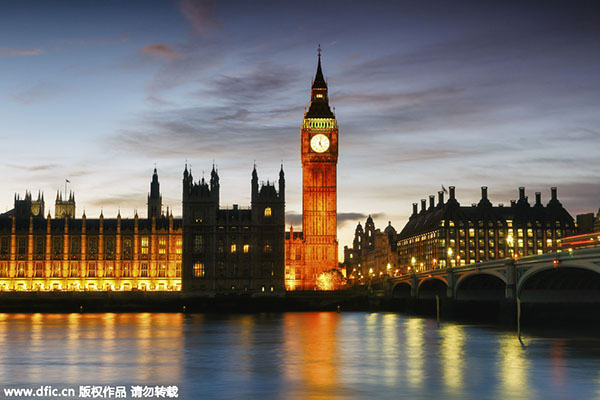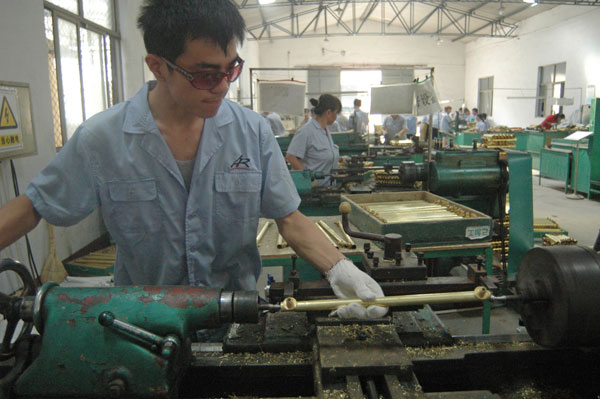China, UK Enter a "Golden Age", says top Chinese finance official
Updated: 2015-07-24 08:42
By Zhang Chunyan(China Daily)
|
|||||||||||
 |
|
Big Ben and Houses of Parliament at dusk in London, UK on November 7, 2014. [Photo/IC] |
Investment and trade cooperation between China and the United Kingdom is entering a golden age, a top Chinese finance official based in London says.
Chinese investment created more than 6,000 jobs in Britain during the 2014-15 fiscal year, according to Jin Xu, the minister counselor for the Chinese embassy's economic and commercial office.
"With 112 projects in the UK this fiscal year, Chinese investment ranked fourth among all foreign countries," making the country the top job creator in the UK among developed countries, he says. "Chinese companies have made a significant contribution to the UK economy through growth and employment, and the UK has been a main destination for Chinese investment."
Jin's comments follow news that data from the embassy showed that more than $1.4 billion (1.26 billion euros) in Chinese investment entered the country during the first six months of 2015, compared with $7 billion for the whole of last year.
Chinese investment in the UK was $100 million in 2004, and since then it has reached $40 billion in total in ten years.
To date, more than 500 Chinese companies have established branches or offices in the UK, expanding into advanced manufacturing, infrastructure, financial services, telecommunications, brand networking, as well as research and development.
One of the UK's largest Chinese investors is Huawei Technologies Co Ltd, which has created nearly 1,000 jobs over the past decade. The company announced in 2012 that it would spend 1.3 billion pounds ($2 billion; 1.82 billion euros) in the country by 2017, split equally between procurement and investment.
Zhejiang Geely Holding Group Co Ltd also announced in March that it plans to invest 250 million pounds to build a facility in Coventry for London Taxi Co, which it rescued from administration. The expansion aims to harness resources and industrial know-how and technology to produce an environmentally friendly, next-generation black cab.
In April, Shanghai-based Greenland Holding Group laid the foundation stone for its Ram Quarter property project in London. The real estate company has invested 1.2 billion pounds in two development projects in Britain.
Britain has been encouraging Chinese investment in its infrastructure, transport and energy sectors, especially in nuclear, high-speed rail, offshore wind power and solar projects.
Since June last year, two Chinese nuclear power companies have reached agreement to invest in the UK's first new nuclear power stations to be built in two decades. The two planned reactors are at Hinkley Point C in Somerset. Led by EDF Group of France, the reactors will cost 14 billion pounds and are slated to begin operation in 2023.
Jin says Chinese firms are now eyeing the HS2 project, a high-speed rail line that will link London with the Midlands and North England. Construction on the first phase is to begin in 2017, with an expected launch date of 2026.
At the same time, British investment in China has also seen healthy growth, increasing 28 percent last year, according to Jin.
China-UK trade reached $36.7 billion in the first six months of 2015, a similar level to 2014. The UK is China's second-largest trading partner in the European Union, while China remains the UK's second-largest trading partner outside the EU.
China is the largest and fastest-growing market for British-built cars outside the UK, such as luxury vehicle manufacturer Jaguar Land Rover. Figures from the British Society of Motor Manufacturers and Traders show that exports to China overall have increased sevenfold since 2009.
Besides cars, which account for half of all British exports to China, food is also a fast-growing export area, Jin says. China has been Britain's second most important food market outside the EU, with exports to China of pork and salmon almost doubling last year.
Between 2009 and 2014, annual trade between China and the UK has gone from $39.1 billion to $80.9 billion. The 2015 target for trade is $100 billion.
The minister counselor says he is confident the investment and trade trends between the two nations will improve and enter the golden age.
The first opportunity is the economic new normal in China and the country's Belt and Road Initiative, a proposed Silk Road Economic Belt and the 21st Century Maritime Silk Road linking China with Europe, he says.
As China's rapid growth shifts down a gear and the economic structure continues to upgrade, he says innovation and domestic consumption are replacing production factors, investment and export as key economic drivers.
"This means steadier economic growth, more diverse economic drivers, and more stable development prospects in China," he explains. "The Chinese market will be more open and dynamic and the Chinese enterprises will become more international."
He also notes that the second opportunity is the continued economic recovery in the UK and Europe as a whole. Both are important destinations for Chinese investment.
"Good news of growth in Europe, especially the strong recovery in the UK, will boost the confidence of Chinese companies when they decide to put their money there," he says.
The third opportunity is the vigor and vitality brought by the forthcoming high-level visits. Chinese President Xi Jinping will make a state visit to the UK in October, after a personal invitation from Queen Elizabeth II, while Premier Li Keqiang has also invited British Prime Minister David Cameron to visit China this year for an annual meeting.
"Close interaction at the top boosts mutual trust," Jin says. "In turn, this drives our business ties forward by opening up new areas and enabling new models of cooperation."
There are many areas in which China and the UK can cooperate more, he says, underlining that Britain was the first major Western country to announce its intention to join the China-initiated Asian Infrastructure Investment Bank in March as a founder member.
"As an important financial center for the world, London can play a special role in Asian infrastructure investment projects," he says, adding that Britain's expertise in financial and service sectors, high-tech and creative industries, and green energy and environmental protection is highly valued.
"The best chapter of China-UK cooperation is just ahead of us."
Related Stories
Chinese companies at the forefront of job creation in the UK 2015-07-24 07:58
UK tough talk on immigration has implications for Hong Kong 2015-07-23 07:27
UK's Osborne tightens screws on government spending plans 2015-07-21 22:36
Eleven sentenced in UK for sex trafficking 2015-07-17 17:50
UK government rejects water cannon use on British mainland 2015-07-15 23:31
UK restricts students' right to work 2015-07-15 07:59
Today's Top News
Greek stock market tumbles after five-week shutdown
Malaysia seeks help to widen search for MH370
Beijing to ban vehicles for V-Day parade
Realty firms in Europe brace for influx of Chinese buyers
China's Bohai bids $2.6 billion for aircraft leasing firm Avolon
Rule covers HIV as work hazard
Probable MH 370 debris to be studied in Toulouse
Beijing makes it, again!
Hot Topics
Lunar probe , China growth forecasts, Emission rules get tougher, China seen through 'colored lens', International board,
Editor's Picks

|

|

|

|

|

|






